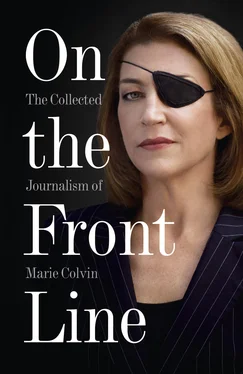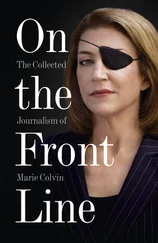By contrast, Peres seems to have believed he was leading a nation converted to peace, satisfied with a booming industry and improved economy. It was a fatal miscalculation. A wave of suicide bombings by Hamas extremists in which dozens of people were killed left the country feeling pessimistic about Peres’s vision of a new and peaceful Middle East.
Supporters of Peres made pilgrimages to the grave of Yitzhak Rabin, the prime minister who was assassinated in November by Yigal Amir, a right-wing student. One left a note saying ‘Sorry, friend’, a melancholy echo of Clinton’s ‘Goodbye, friend’ uttered at Rabin’s funeral.
Netanyahu had been unrelenting in his opposition to Rabin, who led his country into the historic peace agreement with the Palestinians in 1993. Netanyahu would stand among the corpses left by an Islamic fundamentalist attack aimed at stopping the peace process, blame the government for the deaths and call for the revocation of the Oslo accord. He turned a blind eye to posters at Likud rallies depicting Rabin in Nazi uniform. Rabin’s widow, Leah, refused to shake Netanyahu’s hand at his funeral and was said to be in despair at Likud’s victory.
Rabin’s death had left Peres with a seemingly unassailable 26-point lead. But ironically, it was Peres’s attempt to ‘get tough’ that led to his downfall. With his approval, Israel’s security services used a booby-trapped mobile phone to assassinate Yehia Ayyash, a Hamas bomber revered by the Islamic fundamentalist group. Israel hailed the death as a glorious blow against terrorism: but then Hamas struck, killing 63 people in revenge suicide bombings. Peres’s lead was wiped out overnight.
Sensing the newly subdued mood in Israel, Netanyahu restrained his accusations and let the bloody scenes on television do the talking. He moved to capture the political centre, refining his position on the Oslo accord from outright rejection to acceptance of the agreement as a fait accompli that needed revision.
And, in what would be the deciding factor in the campaign, the worldly Netanyahu wooed the ultra-orthodox vote, 10% of the electorate. Netanyahu took to wearing a skullcap and adopted the phrase ‘with God’s help’. He persuaded the rabbis that Likud’s belief in Eretz Israel or the greater Israel that includes the biblical land of the Jews was preferable to Labour’s commitment to territorial compromise.
One of the most dramatic moments of Netanyahu’s campaign came with his endorsement by Rabbi Yitzhak Kadurie, a 106-year-old mystic, 36 hours before polling. Every Israeli newspaper and television station showed pictures of the frail rabbi, his hands resting on the head of a reverential Netanyahu, saying: ‘Bibi, Bibi, Bibi, may God grant that next week you will be premier.’ More than 90% of the ultra-orthodox community voted for Netanyahu. This tipped the election.
Netanyahu was also helped by the disastrous Labour campaign. While Likud was stealing Labour’s message of peace, Labour tried to dress up as Likud. Peres bombed southern Lebanon to hit Hezbollah, the Islamic fundamentalist group, but everyone saw it as an election ploy. The operation backfired when Israeli artillery fire killed 100 Lebanese civilians in a United Nations camp at Qana, losing Peres some of the Israeli Arab support.
In a final blow, Likud mounted a scare campaign that touched on racist themes. Posters proclaimed ‘Netanyahu is good for the Jews’ and warned them that Peres was the candidate of the Arabs.
But Netanyahu still might not have won had Peres not practically given the election away. While a brash and confident Netanyahu pressed ahead, Peres was advised to ignore him and act like a statesman. It is a role that has never worked for him. He has lost every election campaign he has waged, including two earlier runs for prime minister. He could not shake off his image of a loser. The contrast between the two could not have been more noticeable when the results were announced on Friday night. A jubilant Netanyahu greeted crowds as he entered his home in what was an old Arab neighbourhood before 1967, shouting they should welcome ‘a new Israel of peace and security’.
Peres spent the day in seclusion in his 12th-floor apartment in a luxurious suburb of Tel Aviv. He emerged briefly, looking exhausted and speaking in a flat voice. ‘This was not a choice between two parties,’ he told waiting reporters. ‘It was a choice between two different ways. We shall remain loyal to our way.’ But at 72, he can do little to implement his vision. There will be no more elections.
This week will see the first steps towards Netanyahu’s ‘new Israel’. The West and Israel’s Arab neighbours are hoping Netanyahu will be more pragmatic than his campaign rhetoric suggested.
But there are few early signs of moderation. He owes enormous debts to right-wing nationalist and ultra-orthodox religious parties, which themselves won unprecedented numbers of seats in the Knesset. To put together a governing coalition Netanyahu will have to give the right-wing and religious parties ministries and a say in policy.
The lineup for his cabinet includes retired generals Ariel Sharon, the former defence minister who launched the 1982 Lebanon war, tipped for the finance portfolio, and Rafael Eitan, candidate for the Ministry of Domestic Security (police), who as Sharon’s chief of staff enforcing the siege of Beirut announced the Arabs were ‘trapped like drugged bugs in a bottle’. Netanyahu’s new Israel is likely to bear little resemblance to the vision many have had in their sights in the past three years.

Israeli bulldozers rev up for showdown in Jerusalem
JERUSALEM
16 March 1997
Sasson Shem-Tov drives a black Jaguar and wears sunglasses whatever the weather. He does not usually take much interest in politics. But this week he finds himself in the middle of a dispute between Israel and the Arabs that risks bathing his country in blood.
Shem-Tov is about to order his bulldozers into Arab east Jerusalem to help build a Jewish settlement that the Palestinians have vowed to stop by any means. Even America, which is usually supportive of Israel, has denounced its plan to build 6,500 homes for Jews on a hill within sight of the church spires of Bethlehem. On Thursday the United Nations general assembly called for construction to stop.
Yasser Arafat was so angry that he twice refused to take calls from Binyamin Netanyahu, the Israeli prime minister. It is not only the settlement plans that have provoked Arab ire: Netanyahu recently announced that the first step of a three-phase withdrawal from rural areas of the West Bank, mandated under the Oslo accords, would include only a fraction of the territory Palestinians expected. The prime minister then ordered the closure of four Palestinian offices in Jerusalem, a move whose legality is being debated.
King Hussein of Jordan sent a bitter letter charging that the Israeli prime minister was ‘dragging the peace process to the edge of the abyss’. When a Jordanian gunman opened fire on Israeli schoolgirls on Thursday, killing seven of them, commentators in both countries suggested he had been angered by Netanyahu’s intransigence and insinuations.
Shem-Tov, a wealthy Israeli construction magnate, is unperturbed. ‘We are going in next week,’ he said over his car telephone. His yellow bulldozers were already in place near Har Homa, the pine-covered hill Israel seized from Jordan in the 1967 war, which he has been contracted to clear for the new homes. To him, it is just business. But for the right-wing Israeli government, the settlement means much more.
Читать дальше













